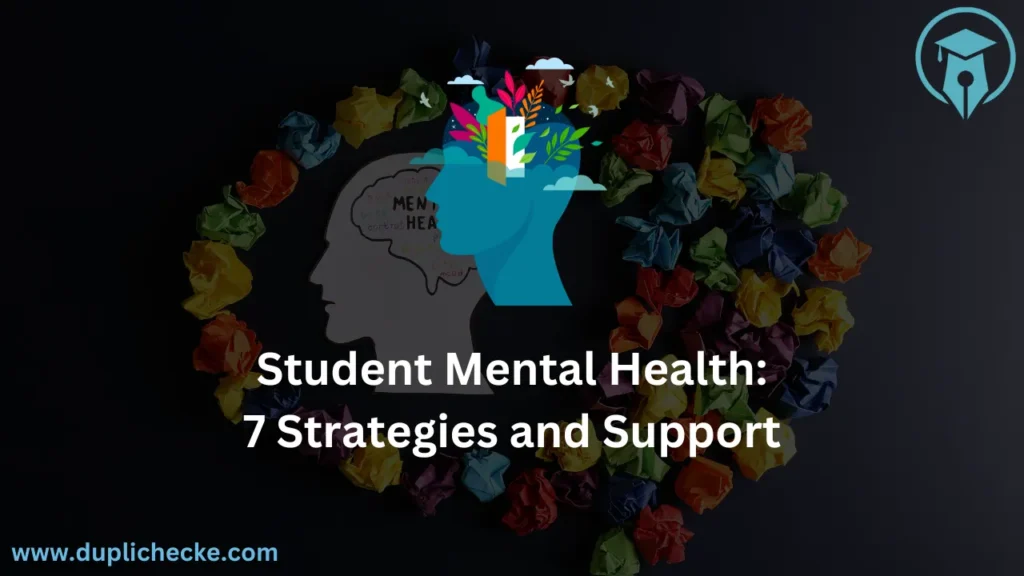Take care of your mental health at university with 7 effective self-care and support strategies for balanced wellbeing.

Mental health is an essential aspect of academic life, and for many students, university can be one of the most challenging times. Dealing with study pressure, tight deadlines, family expectations and financial issues are just some of the factors that can impact emotional wellbeing. Taking care of your mental health and having access to appropriate support is essential to ensuring balanced academic performance and avoiding long-term problems.
If you’re a student who’s feeling like stress is affecting your mental health, there are a number of ways to cope with these challenges. Below, we’ll explore 7 effective strategies and support resources that can make a difference to your mental health throughout your academic journey.
1. Recognize the Signs of Stress
The first step to taking care of your mental health is recognizing the signs that something is wrong. Chronic stress, extreme fatigue, anxiety, irritability, difficulty concentrating, and changes in appetite or sleep are all signs that your body and mind are overwhelmed. Knowing how to identify these symptoms early on can help prevent the problem from getting worse.
To deal with stress, it’s important to take a proactive approach, finding strategies to help you relax and rebalance yourself. Identify what’s causing you stress and try to adjust your routine if possible.
2. Organize Your Time Intelligently
Mastering time management is one of the most important skills a student can cultivate. Being well-organized can help reduce stress and overwhelm. Create a weekly schedule that includes study, rest, and leisure time. Prioritize the most important tasks and break down large projects into smaller steps to avoid leaving everything to the last minute.
There are many online tools that can help, such as planning and task management apps. Having a clear vision of what needs to be done and a structured plan helps keep your mind focused and anxiety at bay.
3. Take Care of Your Body
The connection between body and mind is real. Maintaining a healthy lifestyle, with a balanced diet, regular exercise and adequate sleep, is essential to maintaining your mental health. Studies show that regular physical activity helps reduce symptoms of anxiety and depression, improving mood and ability to concentrate.
Even if your routine is busy, try to set aside at least 30 minutes a day for physical activity, such as walking, swimming, yoga or playing a sport that you enjoy.
4. Set Limits
It’s common for many students to feel pressured to say “yes” to every activity, project, and social invitation. However, it’s important to know how far you can go without overextending yourself. Setting boundaries and respecting your time and energy is a form of self-care.
Learn to say “no” when necessary and avoid compromising your well-being for the sake of external expectations. This applies to both academic and social activities.
5. Seek Emotional Support
College can be a challenging place, but you don’t have to go through it alone. Talk to friends, family, or other trusted people about how you’re feeling. Sometimes, just talking about your worries can ease the tension and help put things into perspective.
Additionally, many universities offer psychological support services. If you feel that stress is becoming too much to handle, seek help from a psychologist or academic counselor. These professionals are trained to guide and support students through difficult times.
6. Develop Mindfulness and Meditation Skills
Practices like mindfulness and meditation are powerful tools for reducing stress and improving focus. They help train the mind to be in the present moment, without getting caught up in anxious thoughts or excessive worries about the future.
There are many free apps and videos that teach meditation and mindfulness techniques. Just a few minutes a day dedicated to these practices can make a big difference in how you deal with stress and emotions.
7. Get Involved in Extracurricular Activities
Participating in extracurricular activities, such as study groups, sports clubs, or volunteering, can bring a healthy balance to your academic routine. These activities help take your mind off the stress of studying and provide a sense of belonging and community.
Additionally, extracurricular activities often provide opportunities to develop social and professional skills that will be valuable in the future. They can also be an important outlet when academic pressure is high.
Support Available at Universities
Many universities are aware of the challenges their students face and offer a variety of resources to help them cope with stress and take care of their mental health. Services such as counseling, stress management workshops, emotional support groups, and academic advising are just a few of the resources that may be available.
At Unit , for example, students have access to counseling and psychological support services, as well as projects focused on students’ well-being and mental health. The institution understands the importance of creating a healthy academic environment where students can thrive both academically and emotionally.
Mental health is critical to academic success and personal happiness
By implementing self-care strategies, seeking support when needed, and maintaining a balanced routine, you will be better prepared to face the challenges of college life . Remember that taking care of your mind is just as important as getting good grades or meeting deadlines. Prioritize your well-being and make use of the support resources available at your educational institution.
Ultimately, college is a journey of growth, and taking care of your mental health is an essential part of that process.